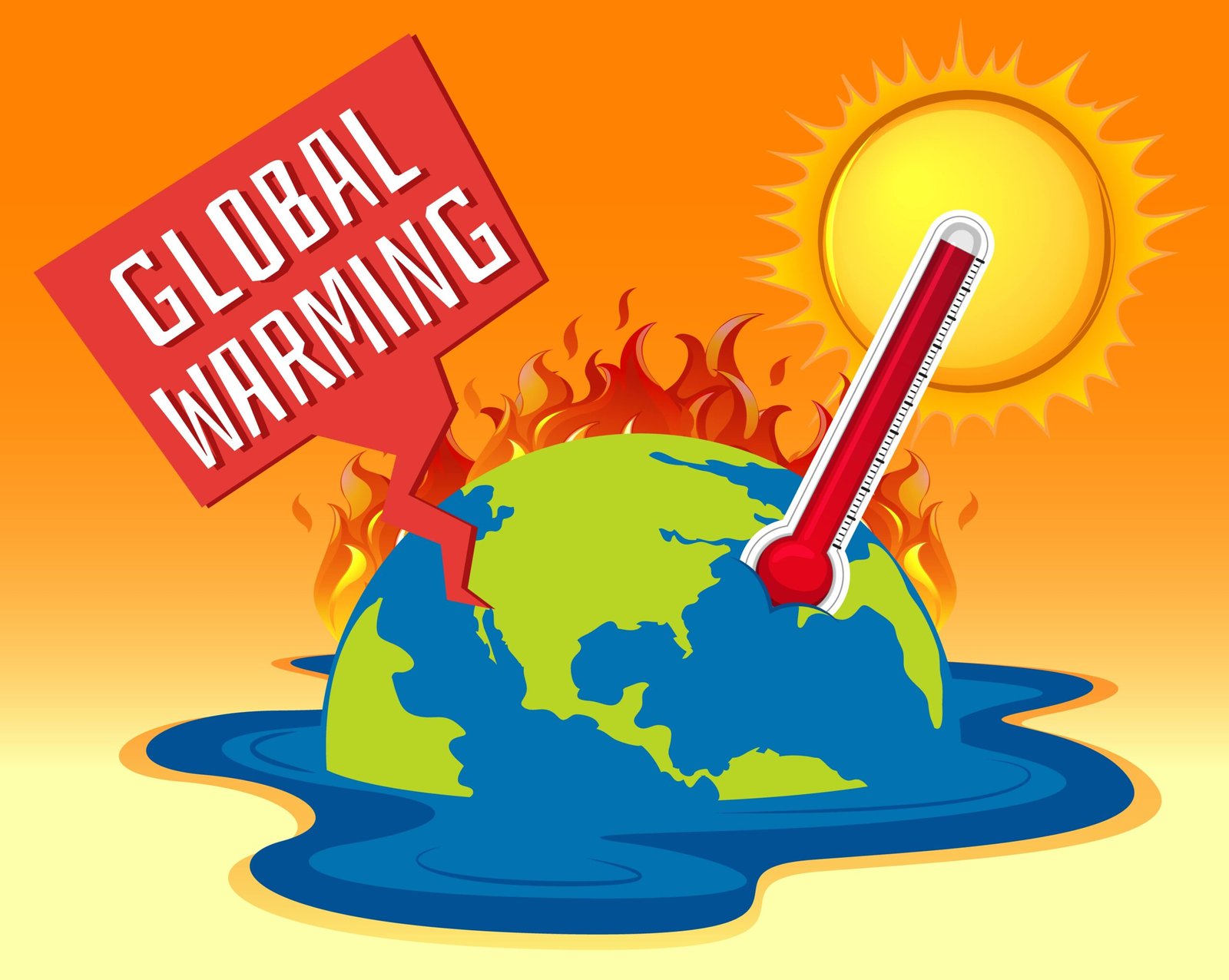Historic Heatwave Rise as Scientists Confirm Human Activities Drive Massive Heat Surge!

Human-induced global warming is accelerating at an unprecedented rate of 0.26°C per decade, the highest pace recorded since systematic tracking began, as reported in the second annual Indicators of Global Climate Change Report. This comprehensive analysis, conducted by over 50 climate scientists under the supervision of the University of Leeds, highlights a significant rise in human-induced warming, which has reached 1.19°C over the past decade (2014-2023), up from 1.14°C noted in last year’s report covering 2013 to 2022.
The year 2023 witnessed the highest rate of global warming ever recorded, with human activities responsible for a staggering 92% of the year’s unprecedented heat, according to calculations by leading climate scientists. Utilizing methodologies approved by the United Nations, a consortium of 57 scientists from around the globe delved into the factors driving last year’s deadly surge in temperatures. Their findings revealed that, despite the increasing rate of warming, there is no significant acceleration in human-caused climate change beyond the heightened burning of fossil fuels.
Human Impact Fuels 92% of 2023’s Scorching Historic Heatwave, Scientists Confirm!
The warming attributed to human activities reached 1.3°C in 2023, with the total global temperature standing 1.43°C above the 1850-1900 average, based on a multi-data set mean used in the study. The report also noted that natural climate variability, especially the El Niño phenomenon, contributed to the record temperatures observed in 2023. The analysis underscores that the remaining carbon budget, which represents the amount of carbon dioxide that can be emitted before exceeding the 1.5°C global warming threshold, is alarmingly low at around 200 gigatonnes (billion tonnes). This amount is equivalent to approximately five years’ worth of current emissions.
Back in 2020, the Intergovernmental Panel on Climate Change (IPCC) estimated the remaining carbon budget for limiting warming to 1.5°C to be between 300 to 900 gigatonnes of carbon dioxide, with a central estimate of 500 gigatonnes. However, continuous CO2 emissions and ongoing global warming have significantly reduced this budget. As of early 2024, the remaining carbon budget for the 1.5°C threshold stands at a mere 100 to 450 gigatonnes, with a central estimate of 200 gigatonnes.
Piers Forster, director of the Priestley Centre for Climate Futures at the University of Leeds, emphasized that their analysis indicates a continued increase in the level of global warming caused by human activities over the past year, even though climate action efforts have slowed the rise in greenhouse gas emissions. “Global temperatures are still moving in the wrong direction and at a faster pace than ever before. Our analysis aims to track the long-term trends driven by human activities,” Forster stated.

He further explained that the observed temperatures result from this long-term trend, which is influenced by shorter-term natural variations. “Last year, when temperature records were shattered, natural factors temporarily contributed around 10% to the long-term warming,” Forster added.
The release of these findings coincides with the Bonn Climate Conference, taking place from June 3 to June 13. This conference is anticipated to set the stage for this year’s climate negotiations and initiate discussions on a new financial goal to replace the current $100 billion per year target. The proposed new financial target aims to channel greater resources toward urgent climate action in developing nations.
During the Bonn conference, UN climate chief Simon Stiell warned that without international cooperation facilitated by the UN, the world could face up to 5 degrees of global heating, a scenario that would be catastrophic for most of humanity. “Currently, we are on track for around 2.7 degrees. This is still perilously high, and there’s a long and steep road ahead to reach our shared goal of 1.5 degrees this century. However, we should be motivated by the fact that we are nearing the halfway point,” Stiell remarked.
Joeri Rogelj, a professor of climate science and policy at Imperial College London, highlighted that the relentless increase in carbon dioxide emissions, coupled with the extraordinary warming observed over the past year, has further diminished the 1.5°C carbon budget. He noted that the current budget is even smaller than what would be expected based solely on past emissions. “Global warming is now at 1.3°C. To prevent the planet from warming by another quarter of a degree by 2035, we must significantly reduce greenhouse gas emissions over the next 5 to 10 years,” Rogelj asserted.
The urgency of these findings underscores the critical need for intensified global climate action and collaboration to mitigate the accelerating impacts of human-induced global warming.
Also Read:

The Psychology of Love: Why Valentines Day Matters More Epic Than You Think
Discover the psychology of love and why Valentines Day is more important than you think. Learn how love impacts the brain, strengthens relationships, and boosts

Premier League Highlights: Arsenal Humiliate Man City 5-1, Spurs and Palace Secure Crucial Wins
Arsenal demolished Manchester City 5-1 in a statement premier league highlights win, reigniting their title hopes. Meanwhile, Crystal Palace stunned Man United 2-0, and Tottenham

How Budget 2025 Impacts the Indian Middle-Class: Major Tax Benefits and Glaring Omissions
Budget 2025 offers major tax relief to the middle class, including zero tax on incomes up to ₹12 lakh. However, it misses out on incentives

Degrees vs Employability: Why “Highly Qualified Degree Holders” Struggle to Find Jobs While “Less Qualified Individuals” Get Hired Faster!
Many highly qualified individuals struggle to secure jobs, while less qualified candidates get hired quickly. This Degrees vs Employability paradox is caused by employer preferences,

The Power of Mindset: Why Looking Poor Doesn’t Make You Poor, but Thinking Poor Does!
Discover why looking poor doesn’t define your wealth but thinking poor does. Learn the power of mindset and how a growth-oriented mindset can lead to

Overthinking: How It’s Damaging Today’s Youth – Causes and Cure in 2025
Understanding how overthinking is silently damaging today’s youth, from its causes rooted in societal pressure and social media to its long-term effects on mental health.
